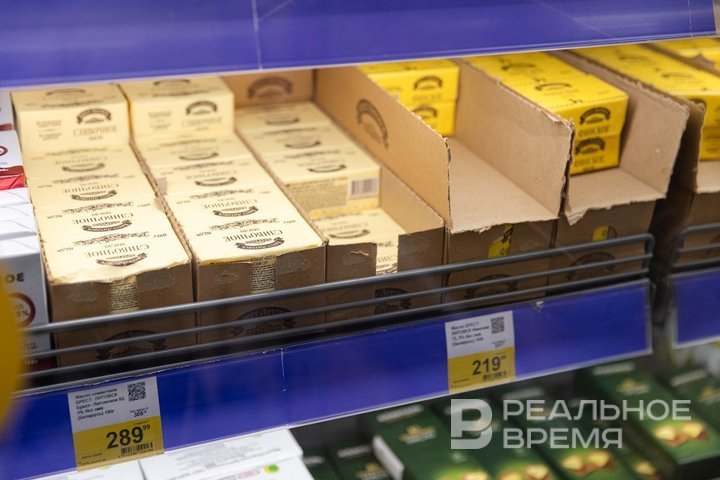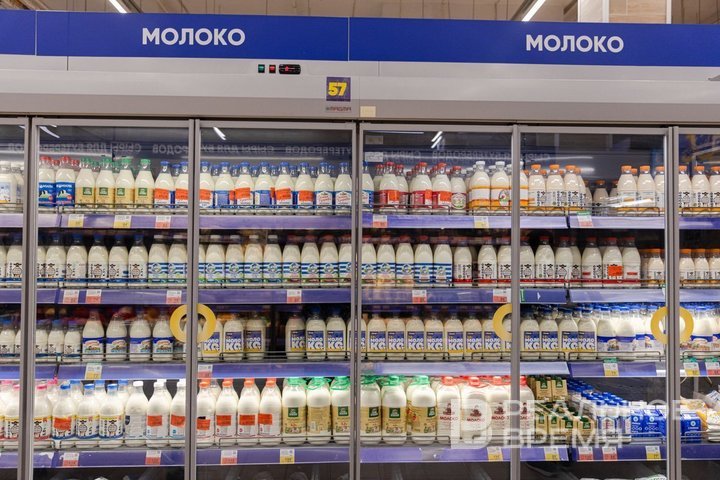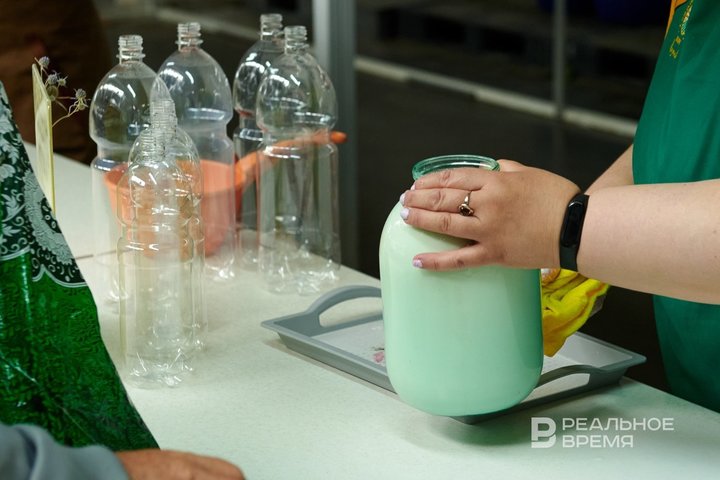Airat Shafigullin: ‘Milk prices are always up and down: sometimes producers complain, sometimes processors do’
Head of the Tatarstan office Russia’s Federal Anti-Monopoly Service on the rise in dairy prices, the situation on the food market and illegal advertising

Sales of butter have fallen in Russia amid rising prices for the product — demand has decreased by 15%, according to research. The decline in sales began several months ago, the reason being record inflation in the category. Over the year, butter in Russia has risen in price by 36.8%, the Russian Statistics Service reported. The product has also noticeably risen in price in Tatarstan, while its quality, on the contrary, has decreased, noted head of the Tatarstan office Russia’s Federal Anti-Monopoly Service Airat Shafigullin. The head of the regional antimonopoly agency spoke in more detail about the prices of dairy products, the situation on the food market of the republic as a whole and the problems of intrusive advertising in an interview with Realnoe Vremya.
“There is already an overabundance of dairy products in warehouses”
Mr Shafigullin, dairy products, primarily butter and cottage cheese, have become almost as expensive as red caviar in the last few months. Have there been any complaints to the Tatarstan office of the Federal Anti-Monopoly Service about the price increase?
We are constantly and systematically working in this direction: collecting and analyzing data, monitoring prices. Surprisingly, there have been no complaints. Perhaps this is due to the fact that the population's income has also increased recently — defence enterprises are working, and they have decent wages, there is a demand for workers, and other employers are forced to catch up.
Nevertheless, many are outraged that sellers demand 200-300 rubles for a 180-gram piece of butter and from 90 to 180 rubles for 180 grams of cottage cheese. Do they check in the republic how justified these prices are?

According to the State Alcohol Inspectorate, which monitors prices weekly, last week the price of butter dropped slightly, but has already reached a level of over 1,000 rubles per kilogram. The price increase over the week was 7.5 rubles, while the quality of dairy products is falling. It is important to clarify that the antimonopoly service does not set prices: the agency assesses the justification for the increase, decrease or maintenance of the price of a product or service and takes response measures if there are signs of a violation of the law. For example, in cases of cartel collusion between manufacturers, when the price unreasonably increases simultaneously and at once for all market participants, or one of them took advantage of their dominant position and began to increase the cost of the product.
Our analysis did not reveal such situations. We monitor the dynamics of price changes, and if prices had increased by 30 percent or more in a short period of time, appropriate measures would have been taken, but there are no such facts. That is, we see that market factors influence the pricing.
Does this mean that the problem cannot be solved?
Why not? There is already an oversupply of goods in warehouses due to a drop in demand. Milk and dairy products are being bought less. And the state has opened the market for dairy products from Belarus and Turkey. And these changes cannot but affect prices.
Where are the dairy “swings” flying?
The problem has another aspect: farmers complain about low purchase prices for milk. The average price in Tatarstan is about 36.5 rubles per liter, but producers in the Nizhnekamsk region buy it for 42 rubles, and in Drozhzhanovsky — for 28. Farmers say that they are forced to slaughter cattle. Does the FAS have the ability to influence the situation?
There is indeed a price difference. It is influenced by many different factors: the remoteness of the area where the milk is produced, its quality, milk yields, working conditions... At the same time, there is no violation of antitrust legislation in what you described. There are many producers and processors in the republic, and there are no enterprises whose share in this market would be recognized as dominant. At the same time, I would like to note that in the situation with milk purchase prices, there have always been some kind of swings: sometimes milk producers complain about low prices from processors, and then processors pay attention to the fact that milk producers have raised prices. In turn, retail pressure is put on processors so that they do not raise prices, since executive authorities are trying to limit the growth of retail prices. This was especially noticeable this year, when milk prices rose sharply, and four months ago we held a meeting with the participation of the Ministry of Agriculture, milk producers and processors.

And what was the result?
I then expressed my opinion: in order to avoid the recurrence of the swings, producers and processors should enter into long-term contracts that are beneficial to both, because both parties are less dependent on fluctuations in purchase prices. But, unfortunately, few people use this tool. Apparently, because of the illusion that using the swing, you can win something.
Were large market players involved in the meetings?
Yes, large ones. The story is more complicated with private farms. They often have questions about the quality of milk, which is different for everyone. Therefore, processors are reluctant to take milk from them directly. And in the chain “producer — processor” there is another link — a trader, and he also wants to get his benefit, which ultimately also affects the purchase price. For example, when the demand for milk was high, they increased their marginality from 2 to 7 rubles per litter, inflating the price for processors.

So, there is no truth in the discussions about the growth of prices for dairy products in retail due to the fact that the prices of fuel, energy, medicines for livestock, water, etc. are growing?
There is truth, prices are actually growing for everything. But here you need to look at the share of each component in the price of milk. And the main share here falls on milk. In a situation where the demand for milk has grown, the profit of producers was more than 20 rubles per litre.
But this is for large producers. And what about small ones? Or are private farms doomed?
As has already been said, it is a little more difficult to work with private farms, but they are also needed. Perhaps they should produce more elite, dietary milk — it is more expensive. We have a demand for farm products, and it is growing.
“We need to take a pen and cross it out”
Your department is closely working in the field of unfair advertising. Recently, the Supreme Court of Russia made a fateful decision on the payment of compensation for moral damages to subscribers for unauthorized calls. Do you think this will reduce spam?
Firstly, I would like to immediately note that this court decision has not changed our approaches to assessing such situations. Moreover, the position developed by our department that the distribution of advertising against the will of the subscriber is a form of “information violence” has been repeatedly supported by the Arbitration Court of the Republic of Tatarstan.
In the cases under consideration, “information violence” contributes to the emergence of a threat of harm to human health. In this sense, the act you mentioned, in my opinion, finally establishes both the illegality of spam mailing and the responsibility of the caller. Including through compensation for moral damage.
As for the impact of this court decision on the spam situation, it should be said that we work a lot in this direction, but it should be noted that mechanisms for blocking such calls have also appeared, although they are not suitable for everyone. In our practice, there are many such cases, and often during the consideration it turns out that the applicants themselves gave consent to the mailing, signed the documents without reading them, and then forgot about it.
Therefore, when assessing the impact of the Supreme Court's decision on the problem of spam calls, it is important to take into account not only the legal aspects, but also the level of awareness of the citizens themselves. Even the strictest court decision will not be able to completely eliminate spam if users continue to automatically check the boxes on documents without delving into the essence of the conditions set out in these documents. After all, it is through consent in contracts or those very checkboxes on websites that unscrupulous advertisers find loopholes for their advertising mailings and calls.
Who distributes such spam most often?
First of all, these are banks. Other violators include clinics and beauty studios offering their services. Today, it is difficult to find an area that has not been affected by such a practice.
And how to deal with this if the phone cannot be “closed” from calls from unknown numbers?
Carefully read the documents that you are asked to sign when applying for a loan or making a purchase. Now, often, not even in the contract itself, but in the consent to the processing of personal data, they add a clause about approving calls, transferring a phone number to other companies with which the companies that provide their services to the client cooperate. You should not be afraid to pick up a pen and write down your disagreement with the clauses concerning calls or sending messages yourself. You can and should add to these documents yourself what exactly you do not agree to — calls from the bank or the transfer of your phone number to third parties.